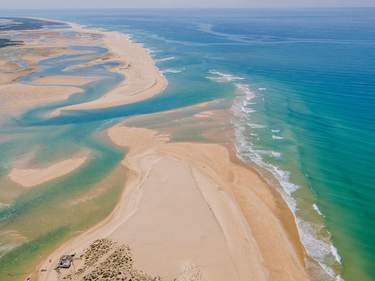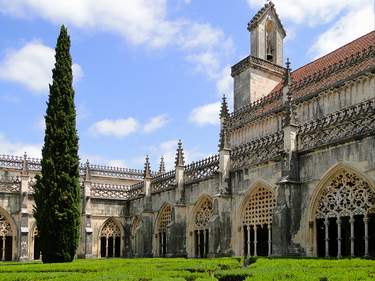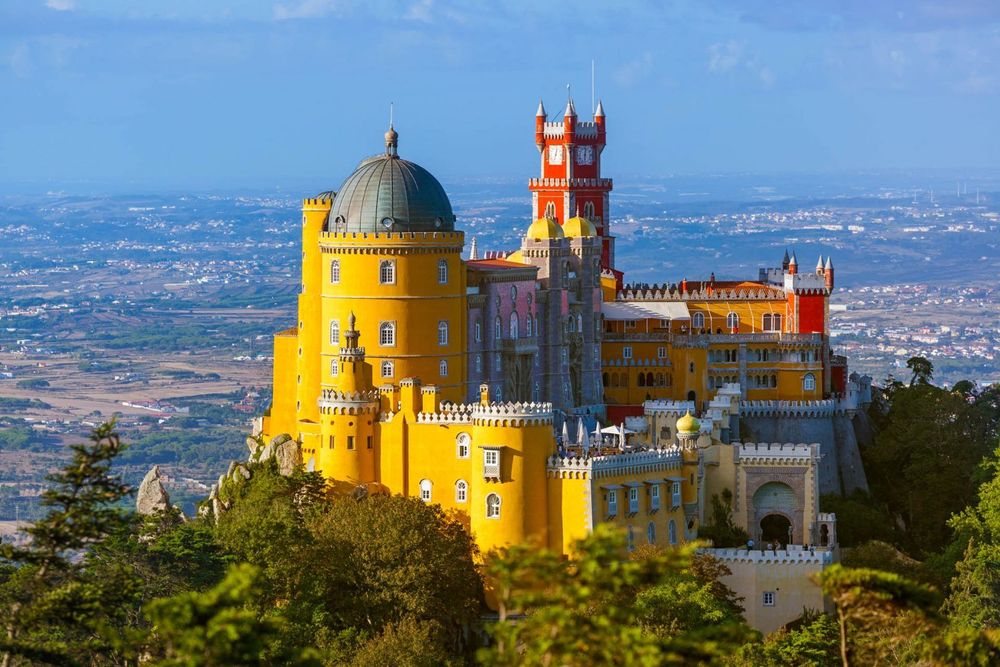
Just wanted to express my thanks to Joel and Rough Guides for a wonderful trip! Everything was well-chosen and we just loved all of the hotels, sightseeing.
One of Europe’s oldest extant nations, Portugal’s landscape is crowned with castles and dramatic walled towns. Then there’s the mountains and beautiful broad beaches; the hearty homecooked food and world-class wine (when you travel to Portugal, you’ll most likely be struck by how affordable it is).

Iberian Blend - Porto and Galicia
Neighbour countries - Portugal and Spain, different and similar at the same time, will surprise you with hospitality and loveliness. This itinerary includes the route of the Northwest part of Iberian Peninsula and offers you to meet beautiful Porto and stunning Vigo in Galicia/Spain.

The Real Algarvian Experience
Experience and discover the real Algarve – taste local produce, drinks and traditional dishes, visit heritage sites and participate in culinary activities. If you are passionate about the people’s culture and gastronomy and want to learn more, this itinerary is for you.

A self drive to Portugal's North and Center
Starting in fascinating Lisbon, this trip allows you to discover Portugal both on your own as well as with guided tours. Driving further up north you'll explore Coimbra and Porto before heading to the Douro Valley and Alentejo.

Porto and the North of Portugal: off the beaten track
From Porto, you'll discover the most fascinating parts of Northern Portugal: go on a hike through unique biodiversity around the Paiva river, take a jeep tour through the slopes of the Serra da Arada and taste the wonderful wines of the Douro valley.

The best of Portugal: Lisbon, Porto and the Algarve
Portugal offers many highlights but when you're short on time, this trip is ideal to cover all the highlights: the capital city of Lisbon, historic Porto, lush Douro Valley and the stunning beaches of the Algarve are all part of this trip.
 Azores Wild Nature" />
Azores Wild Nature" />
Get ready to discover what the largest island of the Azores, São Miguel, has to offer in this short adventure-packed 6-day trip. You will get to swim with wild dolphins, abseil or jump down waterfalls, ride a mountain bike through the Sete Cidades and relax in a natural spa. Adventure awaits!
The information that follows is from The Rough Guide to Portugal, our in-depth Portugal travel guide - check it out for your all your Portugal travel needs.
For more facts about Portugal travel, read our full tips about travelling in Portugal article.
From the picture-perfect Algarve, to historic cities that combine old-time charm with contemporary buzz, to the green north, travel to Portugal serves up a rewarding range of landscapes and experiences across its regions.
The south-facing coast of the Algarve is the country’s tourist epicentre – it’s here you’ll find the archetypal Portuguese cove beaches, fringed by rock stacks and cliffs. If it is beaches you are after, you have almost the entire west coast of the to choose from.
The south of the country is dominated by the Alentejo region, whose wide-open spaces, olive plantations and vineyards invite leisurely exploration. Here you’ll find a Mediterranean-type climate, whitewashed villages bedecked with flowers.
Thanks to its waterfront location and quirky attractions that combine a place-that-time-forgot feel with a modern vibrancy, Lisbon is a fascinating place to spend a few days. Its hills and cobbled alleys are still served by ancient trams that rattle along streets. Nearby, the UNESCO heritage site of Sintra enjoys a cool mountainside location, which made it a favoured summer destination for Portugal’s royals.
The north of Portugal feels far less Mediterranean - the rolling hills are green and lush, and the coastline cooler. At the far north of the Porto e Norte district lie the remote towns and villages of Trás-os-Montes, while to the west Peneda-Gerês is Portugal’s only national park, a verdant landscape of wooded mountains and gushing streams.
Rising up from the banks of the river Douro, Porto, is Portugal’s second city, and wonderfully atmospheric, particularly around the Ribeira, with colourful buildings lining the waterfront. For those looking for sunbathing, there are also a few beaches near Porto.

Colourful Sintra, Portugal palace Palácio da Pena © Shutterstock
Here’s a selection of famous landmarks, attractions and places in Portugal everyone should see in a lifetime - places that’ll hands down enhance your Portugal travel experience.
Discover more great places to see in our ultimate list of things not to miss in Portugal.
Internationally famed for its beaches, golf courses and tennis centres, Portugal also has an ideal climate for a variety of adventure activities, with many regions now offering paragliding, abseiling, rafting, canyoning, caving, mountain biking and 4WD expeditions. There’s most scope in the mountain areas - notably the Serra da Estrela and Peneda-Gerês parks - and on the major rivers (Douro, Mondego and Zêzere), but many of the smaller nature parks and reserves also have local adventure outfits.
Chances are, when you visit Portugal you’ll make time to enjoy some of its amazing coastline. The Algarve has the country’s most popular sandy beaches, many of them sheltered in coves – and the sea is warmest on the eastern Algarve. The western coast has some stupendous stretches of beach, but they face the full brunt of the Atlantic Ocean, making for great surfing ad wind-surfing opportunities - Portugal travel at its most exhilarating. The more protected west coast of the Algarve is excellent for beginners and experienced surfers alike - don’t miss giving it a go when you travel to Portugal.
While Portugal only has one national park - the Parque Nacional da Peneda-Gerês in the north -over forty other protected areas offer incredible walks. Special mention must be made of the lesser-trodden trails of the highest mountains in Portugal - taking in historic villages, waterfalls, windswept rocky plateaus and stupendous views, routes in the Parque Natural da Serra da Estrela are a must-visit for adventurous hikers who visit Portugal. You might want to hire a local Portugal guide with hiking know-how.
Some of Portugal’s other dramatic walking landscapes include the limestone caves of the Serras de Aire e Candeeiros, the island hideaway of the Ilha Berlenga (reached from Peniche), and the lagoons, dunes and marshes of the Ria Formosa.
Whichever region you choose when you visit Portugal, you won’t be short of historic sights to soak up. From Alfama, Lisbon’s ancient heart, with its Moorish castle, to the sparsely inhabited medieval village of Monsaraz. Located near the Spanish border, it sits high above a plain of vineyards and olive groves, with a stunning castle, and charming streets speckled with handicraft shops.
Meanwhile, medieval charm awaits in Coimbra, one of the best places to travel in Portugal for history and contemporary culture. Home to Portugal’s oldest university, the old town exudes old world charm, and a liveliness generated by the student population, with plenty of opportunities to hear fado music - listening to this moving, melancholic traditional song accompanied by guitars is a Portugal travel highlight.
Most large towns have a daily municipal market to pick up fresh meat, fish, fruit, veg and bread, and these are often supplemented by a larger weekly affair, where you’ll also be able to buy clothes, shoes, ceramics, baskets, flowers, and a million-and-one other things you never knew you needed. Shopping in these markets is a wonderful way to experience Portuguese life, and pick up supplies and gifts to take home.
The best flea market in the country is Lisbon’s Feira da Ladra (held on Tuesday and Saturday), while the small town of Barcelos comes alive on Thursdays with one of the best open-air markets in Europe, held since medieval times. If you’re looking to take home some of the loucas de Barçelos, (local white and yellow pottery), traditional basketry and other crafts, you’re in the right place here - it’s a memorable highlight of any Portugal trip.

Beach of Camilo, Algarve, Portugal © Shutterstock
If you’re wondering what’s the best month to go to Portugal, the good news is that one of Portugal’s perks is its year-round sunshine. Although the winter months can be a little chilly, average daytime temperatures are still around 16 degrees. Overall, the best time to travel to Portugal is during late spring (March to May) when it’s warming up, and early autumn (September to October) when the searing heat is losing its edge.
You can fly direct to Lisbon, Faro and Porto from airports around the UK and Ireland and from all over Europe, also from New York in the US and Toronto in Canada. Alternatively, you could consider a combination of driving, rail travel and ferry. Although this could work out more expensive than flying, it’s a great way to see more of the landscape, not to mention leaving a smaller carbon footprint.
An essential part of any Portugal travel guide is arming travellers with a few pointers about getting around. If you’re wondering how to travel around Portugal, be assured that it’s pretty easy and cheap by bus or by train. Bear in mind, though, that stations can be some distance from a town - worth knowing if you travel to Portugal for an off-the-beaten-track trip. As for driving, roads are pretty good, although some rural roads provide a teeth-juddering ride. A top bit of Portugal travel advice is to avoid driving around packed popular resort regions in summer.
Learn more about transportation and how to get around Portugal.

Street and cobblestone floor in the old neighborhood of Alfama, Lisbon © David Evora Marquez/Shutterstock
When considering where to stay in Portugal, you’ll find accommodation is relatively low cost compared with other western countries, although Lisbon and Porto are pricier, as are resorts on the Algarve in summer. Pousadas are some of the most charming best places to stay in Portugal. Usually located in historic buildings, and with facilities and service often matching five-star hotels, these make for a memorable Portugal travel experience.
Food in Portugal tends towards the simple and traditional, with meat usually grilled or slow-cooked into a stew, and seafood a feature along the coasts, for obvious reasons. Trying excellent regional cheeses is an absolute Portugal travel must - the Queijo da Serra from the Serra da Estrela, is a particular standout. And of course, Portugal is the birthplace of Port - true Port comes only from Porto so be sure to try some when you visit Portugal.
Portugal’s carnival celebrations are a match for those in Rio, with Lisbon and towns of the Algarve particularly good destinations for joining in the revelry. Almost every village in Portugal has its own festival (festa) or pilgrimage (romaria), usually to celebrate the local saint’s day or the regional harvest. Among major national events, Easter week and the Santos Populares festivities stand out - celebrated throughout the country with splendid religious processions.
To include a festival in your trip to Portugal, check out the month-to-month overview of festivals in Portugal.
Lisbon lives up to its reputation of having legendary nightlife, with the quiet streets of Bairro Alto (upper town) belying the area’s jumping nightlife credentials, where trendy bars, restaurants and nightclubs rub shoulders with traditional fado houses. Lisbon’s Alcântara area is also home to dockside warehouse conversions housing cool cafés, restaurants and clubs.
Thanks to its student population, historic Coimbra is also known for its nightlife, especially the bars around the Sé Velha cathedral. On the Algrave, picturesque Albufeira has a lively bar scene focussed around the pedestrianized Rua Cândido dos Reis. Late-night clubs can mostly be found in suburbs east of the centre, especially around Oura’s Avenida Dr. Francisco Sà Carneiro (aka The Strip).
Portugal's relatively small size allows you to discover much of the country within a short time while also giving you the chance for more in-depth exploration should you have longer to play with.
Ideas for a weekend in Portugal include booking a city break to Lisbon and taking in a day trip to stunning Sintra. Alternatively, Porto is also an excellent destination for a long weekend - it boasts beautiful architecture, boutique hotels - and then there’s the port. Among ideas for a week or more in Portugal, you could consider a coast-based itinerary, and beach-hop along some of the country’s finest spots to surf and soak up the sun. Alternatively, epicures might want to explore Portugal’s world-class wines through visiting vineyards.
For more inspiration see some of the Portugal itineraries from our Portugal travel guide and local travel experts.

Cavado river and Peneda-Geres National Park in northern Portugal © Sergey Peterman/Shutterstock